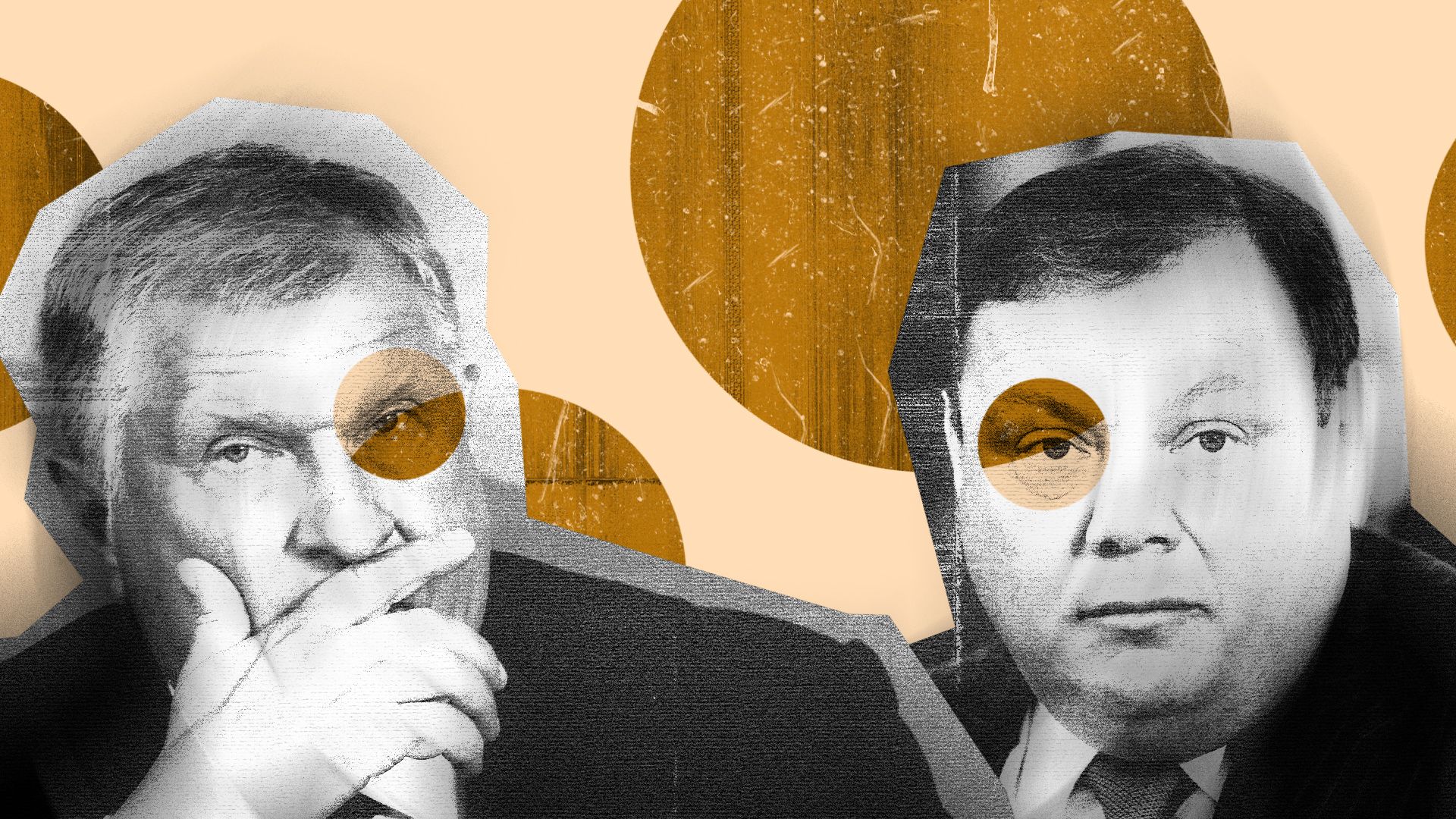| | | | | | | Presented By Emergent BioSolutions | | | | Axios Markets | | By Matt Phillips and Emily Peck ·Mar 01, 2022 | | 👋 Good morning. The markets haven't yet totally buckled under the strain of the sanctions pressure on Russia. - But the invasion of Ukraine, and the Western sanctions that followed, continue to leave major markets — commodities, currencies and bonds — on edge. Follow our live updates.
🚨Join Axios virtually at our inaugural What's Next Summit on April 5. Register to attend sessions with discussions on trends that will revolutionize our future. Today's newsletter is 1,120 words, 4.5 minutes. | | | | | | 1 big thing: Oligarchs feeling the heat |  | | | Photo illustration: Aïda Amer/Axios. Photos: Andrey Rudakov/Bloomberg via Getty Images, Mikhail Svetlov/Getty Images | | | | As broad-based sanctions cripple the Russian economy, the West is also ratcheting up economic pressure targeted at the country's oligarchs — known for their splashy yachts, big-name investments, and piles of dark money squirreled away around the globe, Emily writes. Why it matters: Some of these wealthy Russians may have a measure of influence over Russian President Vladimir Putin. The U.S. and Europe are hoping that if they squeeze the oligarchs, the oligarchs may pressure Putin. In the longer term, going after hidden Russian wealth could curtail the power of Putin and his circle. Driving the news: The EU on Monday banned travel and froze the assets of 26 leading businessmen, government officials and even journalists with longstanding ties to Putin, the FT first reported. The sanctions add to a pile that has been levied against oligarchs and their family members. - On the list: Igor Sechin, CEO of Rosneft, Russia's state oil company, "considered to be one of the most powerful members of the Russian Political elite," the EU said in its statement.
- Nikolay Tokarev, the CEO of Transneft, a major oil and gas company, is also among the West's specific targets. He served with Putin in the KGB in the 1980s, and is one of the oligarchs who took control of state assets in the 2000s, the EU said.
Details: There are three classes of the Russian elite, said Chris Miller, director of the Eurasia program at the Foreign Policy Research Institute. - First, those who made their money in business and had to cut deals with Putin and his predecessors to keep hold of their assets. They're the most well-known oligarchs, he said. They include Mikhail Fridman, the co-founder of Alfa Group, a Russian conglomerate. He was on Monday's EU blacklist.
- Then there are those who acquired fortunes simply because they've been given stakes in companies — "judo sparring partners from the 90s who are now billionaires," Miller said.
- Finally, there are the men who have control over real economic assets. This category includes the CEOs Sechin and Tokarev. "They actually have political influence; their careers and networks extend beyond their relationship with Putin," Miller said.
Yes, but: There's a lot of Russian money hidden around the globe, including in the U.S. and U.K. — and it's not always clear where it is. "Nobody knows anything and therefore can't do anything," said Anders Åsland, a senior fellow at the Stockholm Free World Forum and the author of "Russia's Crony Capitalism." - Recent laws passed in the U.S. and EU are intensifying efforts to untangle this dark web, but they're just at the start.
The bottom line: "How much can we disrupt the oligarchs? We don't know," said Gary Kelman, director of Transparency International, an anti-corruption group. "There's money all over the world we can't touch because we have no idea where it is." |     | | | | | | 2. Catch up quick | | 🛢 Owner of Nord Stream 2 considers insolvency after sanctions. (Reuters) 💳 Mastercard and Visa block multiple financial institutions in Russia. (Yahoo Finance) 🚘 Toyota resumes production in Japan after a suspected cyberattack. (AP) |     | | | | | | 3. Keep an eye on commodities |  Data: FactSet; Chart: Axios Visuals For all the volatility in stock, bond and currency markets since Russia invaded Ukraine, it's the shifts in commodity markets that look most likely to ripple out and touch the world economy, writes Axios' Neil Irwin. - That was particularly true yesterday, as futures prices for many staple energy and food commodities soared, while stocks were down only modestly.
Why it matters: With inflation high, price spikes in fuels and food are unwelcome — and could be downright destabilizing in poorer nations. By the numbers: U.S. crude oil rose 4.5% yesterday and is up 27% this year. - Wheat futures were up 8.7%, and are up 21.4% so far in 2022. Corn was up 5.4%, and 16.5% for the year.
- Palladium, a metal used in electronics that is mined in Russia, was up 5.4% yesterday and 30% this year.
As higher commodity prices work their way through the economy, expect them to cause financial stress throughout supply chains. - That includes consumers who have already experienced 7%-plus inflation over the last year — and are not at all happy about it. (See the bad news on gas prices, below.)
It is a conundrum for the Federal Reserve and other central banks. - Normally wild swings in commodity prices are viewed as one-off shifts, rather than part of underlying inflation dynamics.
- But these price spikes are arriving at a time when inflationary psychology is already showing signs of setting in.
The bottom line: War in Europe is going to mean more expensive staple goods worldwide, and more popular discontent even in places far from the battlefield. |     | | | | | | A message from Emergent BioSolutions | | We Go to protect against public health threats | | |  | | | | Emergent develops, manufactures and delivers protections against critical health threats — from fighting cholera and smallpox to counteracting opioid overdoses, and manufacturing vaccines and treatments that create a better, more secure world for us all. And that's why We Go. | | | | | | 4. ⛽️ Pain in line at the pump |  Data: FactSet; Chart: Axios Visuals Global energy costs were already surging before Russia invaded Ukraine, and Americans aren't going to get any relief at the pump any time soon, Matt writes. Driving the news: U.S. gasoline futures climbed to the highest level in nearly eight years yesterday. - That means there's little sign of relief in sight, as national retail gas prices average $3.60 a gallon, according to AAA.
- Consumer gasoline prices were up 40% in January from the prior year.
Why it matters: The West has been remarkably unified in response to Russia's attack. But it's only been a few days, and politicians could come under pressure to break ranks as consumers face sanctions-related inflation. Yes, but: The gasoline surge isn't all bad news, it also reflects the fact American gasoline demand is back to its pre-COVID levels, as the pandemic finally recedes and people get back on the road. |     | | |  | | | | If you like this newsletter, your friends may, too! Refer your friends and get free Axios swag when they sign up. | | | | | | | | 5. Job gains lost on voters |  Navigator Research; Chart: Sara Wise/Axios The U.S. economy saw record job growth over the past year, but a lot of regular folks apparently didn't get the memo, writes Emily. Why it matters: This is a political headache for President Biden, who will be making the case in tonight's State of the Union that we're in "one of the strongest labor market recoveries in American history," according to the White House's notes. - The survey also follows numerous reports of Americans feeling like the economy is more bummer than boom — particularly because record high inflation is mostly erasing any wage gains they might be seeing.
Details: In a survey last week, 37% of voters said they believed more jobs were lost last year than gained, according to polling conducted by progressive group Navigator Research. Only 19% believed the U.S. is seeing more job growth than usual. Background: The U.S. has been through a wild up-down on jobs since spring 2020 when the unemployment rate reached levels last seen during the Great Depression. - Since then, we've seen an astonishing recovery. The economy added 6.6 million jobs over the last 12 months.
Bottom line: The jobs recovery is impressive, but in so many other ways Americans' lives are in a state of flux. Go deeper |     | | | | | | A message from Emergent BioSolutions | | We Go to protect against public health threats | | |  | | | | Emergent develops, manufactures and delivers protections against critical health threats — from fighting cholera and smallpox to counteracting opioid overdoses, and manufacturing vaccines and treatments that create a better, more secure world for us all. And that's why We Go. | | |  | Bring the strength of Smart Brevity® to your team — more effective communications, powered by Axios HQ. | | | | | | Axios thanks our partners for supporting our newsletters. If you're interested in advertising, learn more here.
Sponsorship has no influence on editorial content. Axios, 3100 Clarendon Blvd, Suite 1300, Arlington VA 22201 | | | You received this email because you signed up for newsletters from Axios.
Change your preferences or unsubscribe here. | | | Was this email forwarded to you?
Sign up now to get Axios in your inbox. | | | | Follow Axios on social media:    | | | | | |
Post a Comment
0Comments